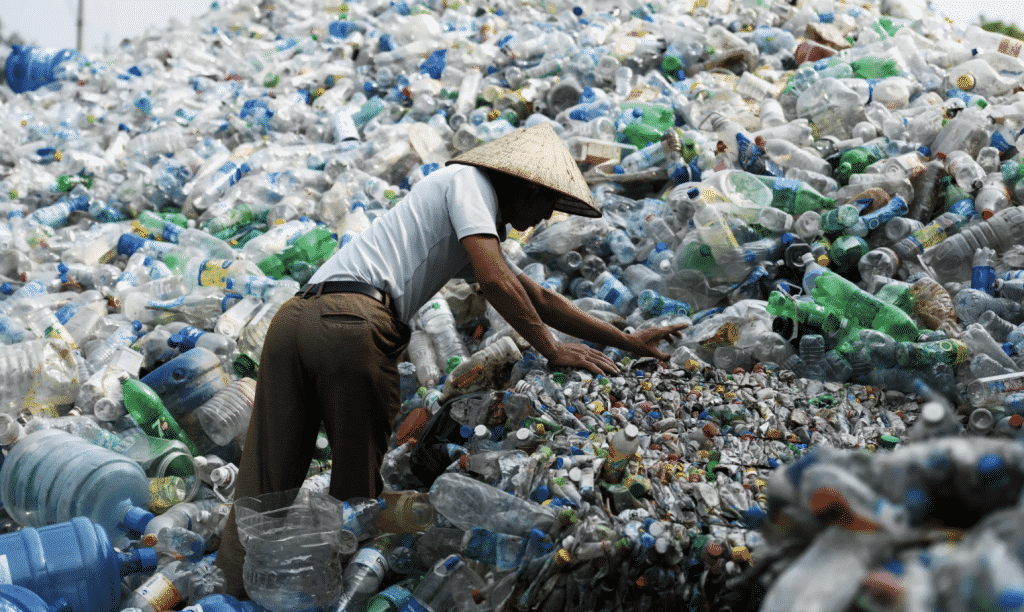China is the world’s largest importer of recyclable waste materials, with over a staggering 30,000,000 metric tonnes each year.
It is recorded that Australia exported over 748 thousand metric tonnes of recycled waste straight to China in the 2018 financial year.
The Chinese Government, in July 2018 announced that they would no longer accept foreign recyclable waste from entering the country because of rising environmental concerns and health issues impacting the public. The new policy will stop companies from importing solid waste (unrecyclable, often toxic and hazardous waste) by December 2020. China also said most plastic was garbage and too dirty to recycle.
This drastic change caused Australia to rethink recycling strategies and allocate more money and time on recycling plastic separation. The Australian Federal Government has now pledged $20,000,000 to help overhaul Australia’s recycling sector.
Conditions in Australia’s Recycling Industry
The recycling industry in Australia has been faced with many challenges regarding its attempts to recover recyclable waste. Australia produces 67 million tonnes annually of waste, which includes 2.5 million tonnes just on plastics. This amounts to 540KG of household waste per person, each year
Australia generates more waste than other countries, but recycles less due to its dependence on China for recyclables. Without a long-term, functional solution, recyclables end up being tossed out and end up in the already overflowing landfills.
There are currently 193 recycling and waste recovery facilities in Australia. However, this is not enough as only 55% of the waste collected from households are being recycled and this needs to greatly improve. The technology requires that glass, paper, and plastic be separated and processed for recycling. Australia needs to greatly improve the recycling sector.
There are ways to address the local recycling crisis
Recycling rates in other countries of the first world are lower than those for waste generation. In Europe, 37% of waste is recycled, while the United States has a rate of 34%. Recycling can be complicated and must be done at first the domestic level.
Getting Informed
One reason for the recycling crisis in Australia is the lack of knowledge presented to informing or educating Australian households on the ethical standards of recycling and holding them accountable. Education is key, holding each household accountable for a sustainable future is also vital. When, there is a lack of support in education regarding proper recycling methods or access to recycling facilities becomes inaccessible. It is easy for the average Australian household to put it in the too hard basket and trash everything out. It is not the right way to go about it. When a recycling bin contains the wrong recyclable content, the recycling plants cannot properly sort out the materials and consequently the whole bin ends up in general waste ending up in landfill. That is why, it is important to get educated and the government needs to provide constant reminders, training and visual material to help each and every household understand what effective recycling is exactly like the guys who do rubbish removal.
Living in Australia we are blessed being able to move freely and live interstate and in doing so we encounter lots of rubbish when we do move. However, when it comes time to trash it out, we need to be mindful on ethically disposing of rubbish. After you are done hiring an interstate removals company for your move, ensure you also hire an ethical rubbish removal company that imposes ethical standards and stringent recycling methods, that will prevent every bit of waste going to landfill by exhausting all options of reusing or recycling what is being tossed out.
Rollout of Smart Bins
Melbourne is Australia’s second largest city in terms of population. It has taken on the recycling challenge head on and has been upgrading and modernising its waste management policies.
The rollout of smart bins has been introduced to help reduce waste overflow in Melbourne’s street garbage cans. These smart bins are placed in busy areas and have been selected to track rubbish sources.
Smart bins offer many benefits and are extremely efficient and effective waste recycling tools. The whole process of waste sorting becomes much easier and quicker with fewer trips to the collection station and fewer traffic interruptions.
Reduce Disposable Plastics
Until now, sustainable waste and recycling policies have been centered around existing recycling and landfill industries. These problems are caused by a deep-rooted habit that we have been practicing for many decades in which companies indulge in the production of large-scale plastic packaging. Plastic however is one thing that can take many generations to breakdown. The ban on plastic bags at major supermarkets and also the phasing out of disposable plastic products have been welcomed by many Australians and embraced towards a sustainable future. Many Australians seeking alternatives such as reusable shopping bags made of canvas or cloth instead of plastic bags.
Australia has a very bright future and the impact of China refusing foreign waste is only a blessing in disguise presenting an opportunity for Australia to clean up its own recycling crisis. The future of Australia is bright, and this is the way forward if Australia wants to move to an effective sustainable and recycling future.
